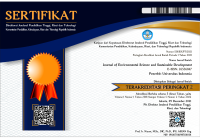Publication Ethics & Malpractice Policy
The Journal of Environmental Science and Sustainable Development (JESSD) upholds publication ethics standards in accordance with the Committee on Publication Ethics (COPE).
Publication Ethics - Authors
- Reporting Standard: Original research submissions must provide a precise account of the conducted work and an objective analysis of its significance. All underlying data must be accurately presented within the manuscript. Publications should include comprehensive details and references sufficient for research replication.
- Originality and Plagiarism: Authors must ensure their submissions constitute entirely original work. When incorporating others' work or words, appropriate citation or quotation is mandatory.
- Multiple, Redundant or Concurrent Publication: Authors should refrain from publishing manuscripts that describe substantially identical research in multiple journals or primary publications. The simultaneous submission of the same manuscript to multiple journals constitutes unethical behavior and is strictly prohibited.
- Acknowledgement of Sources: Authors must provide appropriate recognition of others' contributions. Citations should acknowledge all publications that have significantly influenced the reported research.
- Disclosure and Conflicts of Interest: Authors are required to disclose any financial or substantive conflicts of interest that could potentially influence their results or interpretations. All financial support sources for the research must be explicitly declared.
- Fundamental errors in published works: Upon discovering significant errors or inaccuracies in their published work, authors are obligated to promptly inform the journal editor or publisher and collaborate in implementing necessary retractions or corrections.
- Self Citation: Authors are strictly prohibited from citing their own work previously published in the Journal of Environmental Science and Sustainable Development within new submissions.
Publication Ethics - Editors
- Fair Play: Editors shall evaluate manuscripts solely based on intellectual content, regardless of authors' race, gender, sexual orientation, religious belief, ethnic origin, citizenship, or political philosophy.
- Confidentiality: Editorial staff must maintain strict confidentiality regarding submitted manuscripts, sharing information only with relevant parties such as corresponding authors, reviewers, potential reviewers, editorial advisers, and publishers as appropriate.
- Disclosure and Conflicts of Interest: Editorial staff may not utilize unpublished material from submitted manuscripts in their own research without explicit written authorization from the author.
- Criteria of Editors: Editorial appointments, both local and international, require either an H Index / Scopus ID or published work in a Scopus-indexed International Journal, particularly in Environmental Science and Sustainable Development. Editors may supplement reviewer assessments with additional manuscript feedback.
- Publication Decisions: The editorial board bears responsibility for publication selections, guided by manuscript validity and relevance to the field. Decisions must comply with legal requirements regarding libel, copyright infringement, and plagiarism, with potential consultation among editors or reviewers.
- Review of Manuscripts: Editors must verify each manuscript's originality and implement peer review processes equitably. They should clearly communicate peer review procedures to authors and specify which journal sections undergo review. Reviewer selection should prioritize appropriate expertise while avoiding conflicts of interest.
Publication Ethics - Reviewers
- Contribution to Editorial Decisions: Peer reviewers support editors in making publication decisions and assist authors in manuscript improvement through editorial communication.
- Criteria of Reviewers: Reviewers must possess publications in Scopus-indexed International Journals, specifically in Environmental Science and Sustainable Development. They should demonstrate expertise in the manuscript's subject matter through published works or specialized research experience.
- Standards of Objectivity: Reviews must maintain objectivity, avoiding personal criticism. Reviewers should articulate their assessments clearly with supporting evidence.
- Confidentiality: All manuscripts under review must be treated as confidential documents, with discussion limited to authorized parties.
- Disclosure and Conflict of Interest: Information gained through peer review must remain confidential and unused for personal advantage. Reviewers should recuse themselves from manuscripts where conflicts of interest exist.
- Acknowledgement of Sources: Reviewers should identify relevant uncited published work and ensure proper citation of previous findings. Any substantial similarities with other publications should be reported to the editor.
- Time Periode of Reviewing: Review completion is expected within 1-2 months maximum. Each manuscript requires between 2 (minimum) and 5 (maximum) reviewers






